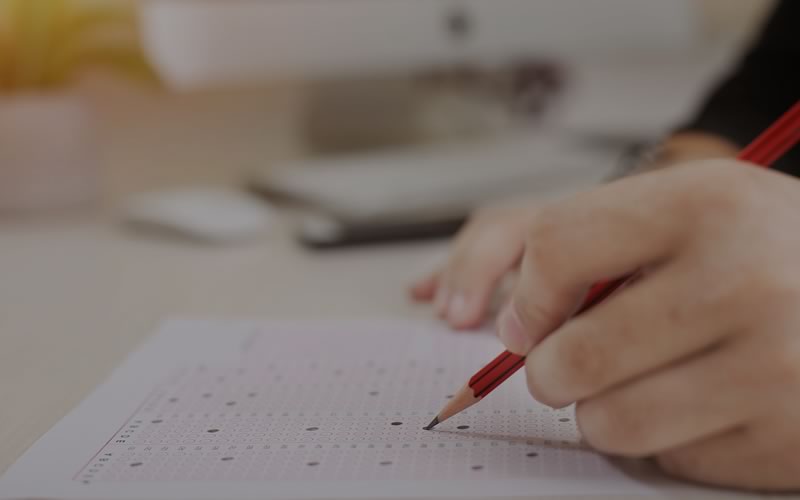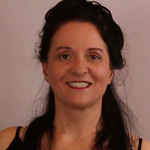
In this lesson I’m going to give you three tips to help you get a higher score in your English exam.
If you follow the advice I give you here, and practise daily, you’ll be able to raise your score within two months.
When I applied to do a Master’s degree in English Literature at the University of Edinburgh, I needed to get a high score in my English exam. For a couple of months I worked daily on my English, focusing on the topics that I cover in this lesson. My English skills improved noticeably in those two months, and I passed my exam without trouble.
If anyone ever tells you that you cannot make fast progress with your English, don’t listen to them. I did it, and so can you. Here’s my first tip.
Learn the 45 British English sounds
with Maria’s pronunciation course
Tip number 1: avoid making basic mistakes
Nothing lowers your marks in an exam more than making basic mistakes.
Even if you have an extensive vocabulary and your word order is flawless, if you make basic mistakes, your score will suffer badly. Let me show you two basic mistakes that you should avoid.
Mistake number 1: getting the noun-verb agreement wrong
Many noun-verb agreement mistakes are bad, but failing to add an S to verbs in the third person singular in the present tense, is a catastrophic mistake.
To master this noun-verb agreement, practise reading out and writing short sentences like these:
He likes swimming.
She goes home.
Peter knows her.
Elizabeth writes letters.
My sister looks at the sky.
This is such an important issue that it’s not enough practising it until you get it right. You must practise it until you cannot get it wrong.
The second basic mistake to avoid is: overusing the article “the”
There are many cases in which the article “the” is often omitted in English. Here are three of them:
Number 1. With languages and nationalities, for example:
She is Japanese.
Italian is a beautiful language.
I’ve been studying French for many years.
Number 2. With sports, for example:
He likes to play golf.
Football is a popular game.
John doesn’t watch tennis on TV.
And number 3. With academic subjects, for example:
Biology is her favourite subject.
She’s studying chemistry at university.
My cousin prefers history to maths.
A note of warning: beware that there are many exceptions to those rules. You’ll need to work on them to master the article “the”.
In this lesson, I’m giving you three tips to help you get a higher score in your English exam. Tip number 1 was: avoid making basic mistakes. Let’s move on to the second tip.
Learn the 45 British English sounds
with Maria’s pronunciation course
Tip number 2: learning vocabulary by listening to audiobooks
The technique that has allowed me to learn thousands of English words and reach a near-native level is this: I’ve always studied words in context, and I’ve never made lists of words.
Studying lists of words is a big waste of time. The human brain doesn’t like learning things out of context, that’s why it’s impossible to remember words that you’ve learned from random lists.
What the human brain loves is making connections between the new bits of information that it gets and the information it already knows. Let me give you a great example.
Suppose you want to learn these five words: evict, spot, crawl, babysitter, bare.
I’ll give you the definition of these five words:
“Evict” is to force someone to leave a place.
The verb “spot” means: to see or notice someone or something.
The verb “crawl” means: to move along on hands and knees.
A “babysitter” is someone who takes care of a child while the parents are out.
And the adjective “bare” B.A.R.E. “bare” means: without any clothes or shoes.
Learning these five words just like that, by trying to remember their definition, or their translation into your first language, is a frustrating exercise. No matter how much time you spend on single words like those, a day later you’ll be lucky to remember two of them. And you won’t be able to use them in context.
Now imagine that you were to learn those five words by hearing them several times in whole sentences.
I’ve taken these five words from a book called On Writing, by the American author Stephen King. By the way, it’s a book that I throughly recommend if you’re interested in writing better English. Let’s hear the paragraph with the words: evict, spot, crawl, babysitter, bare.
Here’s the paragraph:
“We were evicted from our third-floor apartment when a neighbor spotted my six-year-old brother crawling around on the roof and called the police. I don’t know where my mother was when this happened. I don’t know where the babysitter of the week was, either, I only know that I was in the bathroom, standing with my bare feet on the heater, watching to see if my brother would fall off the roof or make it back into the bathroom okay. He made it back. He is now fifty-five and living in New Hampshire.”
The first word on our list, “evicted”, appears in the main clause: “We were evicted from our third-floor apartment”.
“Evict”, as we saw, is to force someone to leave a place: “We were evicted from our third-floor apartment”.
The verbs “spot” and “crawling” appear in the embedded clause: “when a neighbor spotted my six-year-old brother crawling”.
“Spot” means: to see or notice someone or something. And to “crawl” is: to move along on hands and knees. “When a neighbor spotted my six-year-old brother crawling”. In other words: when a neighbor saw my six-year-old brother moving along on his hands and knees. “When a neighbor spotted my six-year-old brother crawling”.
The fourth word on our list was: “babysitter”. It appears in this sentence: “I don’t know where the babysitter of the week was”. A “babysitter” is someone who takes care of a child while the parents are out. “I don’t know where the babysitter of the week was”.
And the final word on our list was the adjective “bare”: “I was in the bathroom, standing with my bare feet on the heater”.
“Bare” means: without any clothes or shoes. “I was in the bathroom, standing with my bare feet on the heater”.
Let’s hear the full paragraph once more:
“We were evicted from our third-floor apartment when a neighbor spotted my six-year-old brother crawling around on the roof and called the police. I don’t know where my mother was when this happened. I don’t know where the babysitter of the week was, either, I only know that I was in the bathroom, standing with my bare feet on the heater, watching to see if my brother would fall off the roof or make it back into the bathroom okay. He made it back. He is now fifty-five and living in New Hampshire.”
This great book has a fantastic audiobook version read by the author himself.
If you want to expand your English vocabulary fast, listening to audiobooks like this works a lot better than making lists of words, and it’s a lot more fun.
Listening on a daily basis to audiobooks that I enjoy is how I’ve learned most of the English words I know today.
In this lesson, I’m giving you three tips to help you get a higher score in your English exam.
Tip number 1 was: avoid making basic mistakes. And tip number 2 was : learn vocabulary by listening to audiobooks.
Let’s move on to the third and final tip.
Learn the 45 British English sounds
with Maria’s pronunciation course
Tip number 3: improve your English pronunciation
In the IELTS exam, your pronunciation counts for 25% of the total score. But that’s only in theory. In reality, in counts for a lot more than 25%. That’s because another 25% is for fluency, and without a good pronunciation you cannot have good fluency.
Which means that improving your pronunciation is what’s going to make the biggest difference to your final score.
But how do you improve your English pronunciation fast?
In my experience, by avoiding the biggest mistakes you’re currently making. Four of your biggest pronunciation mistakes are likely to be these:
Failing to produce the neutral vowel called “schwa”
Failing to produce the dark L
Getting the long and short vowels wrong
And mispronouncing the verb forms ending in ED
Pronunciation mistake number 1: failing to produce the neutral vowel called “schwa”
Standard British English has twelve single vowel sounds. The schwa is one of them.
The schwa is the most common sound in English, and the one that contributes the most to its elegant rhythm. The schwa is a short vowel that sounds like this: /ə/
In English, all five written vowels can have the schwa sound. For example, the A E I O and U in these five words all have a schwa sound: again, water, terrible, observe, upon.
Here are some rules that tell you when a word has a schwa sound:
In words starting with an unstressed A + consonant that initial A is likely to have a schwa sound. For example: around.
The unstressed ER ending in comparative adjectives has a schwa sound. For example: better.
In the unstressed MENT ending the E has a schwa sound. For example: treatment.
In words starting with an unstressed O + consonant that initial O is likely to have a schwa sound. For example: offensive.
The unstressed URE ending has a schwa sound. For example: future.
To find out more about the schwa, how produce it, the mistakes to avoid, and all the other rules, have a look at my English pronunciation course.
Pronunciation mistake number 2: failing to produce the dark L
In English, the letter L has two different sounds: light L and dark L.
The light L is the sound you’ll be most familiar with. Here’s the rule that tells you when the English L is light:
For the L to be light it must come before a vowel sound. The light L appears in words like: lemon, sleep, nearly, plus.
And here’s the rule that tells you when the L is dark:
For the L to be dark it must come before a consonant sound or at the end of a word. The dark L appears in words like: silver, wild, animal, email.
To produce the light L, the tip of the tongue rests on the ridge behind the top front teeth. And to produce the dark L, the tip of the tongue rests on the ridge behind the top front teeth and the back is raised.
In other words, the difference between the light and the dark L is that in the dark L the back is raised.
In my English pronunciation course you can see the images that compare the two tongue positions. There you can also practise producing these two sounds, and distinguishing them.
See my English pronunciation course.
Pronunciation mistake number 3: getting the long and short vowels wrong
In this blog post I showed you how to produce the long and short vowels, and we practised them. Go back to that post to make sure you’re getting the long and short vowels right.
And, finally:
Pronunciation mistake number 4: mispronouncing the verb forms ending in ED
In this blog post we saw the three pronunciations that the ED can have.
Learn the 45 British English sounds
with Maria’s pronunciation course
